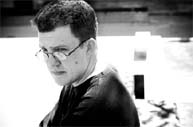How technology makes citizens
Communications professor and CRC looks beyond the internet
With a background in political theory, it seems incongruous at first that Darin Barney would hold a Canada Research Chair in Technology and Citizenship in the Department of Art History and Communication. "I've become the poster boy for interdisciplinarity," jokes Barney on his unusual academic trajectory.

Canada Research Chair Darin Barney
Claudio Calligaris
Barney began to explore the relationship between technology and democracy for his political theory dissertation a decade ago. The route, which has led him from his home in Vancouver through his PhD at the University of Toronto and a position in Ottawa before he came to McGill this past year, is more than just an advert for mixing up disciplines. Especially when you factor in his inaugural win of the Social Science and Humanities Research Council Aurora Prize for outstanding contribution by a new researcher.
When he became interested in technology as a political issue, he recognized that "political scientists weren't the only people talking about this — maybe not even the best people." His attempts to understand the impact of technology on political life led him to the work of those in communication and cultural studies, sociology and laws as well as the philosophy of technology.
"There was an emerging popular discussion, but there wasn't a lot of substantial scholarly work," says Barney. That work eventually led to the publication of Prometheus Wired: The Hope for Democracy in the Age of Network Technology.
But that was just the start. Work on the internet has evolved in the last 10 years and is entering "a new phase in empirical and case study work," says Barney. "My [earlier] work was in fairly broad strokes." His next project will focus on specifics.
Barney explains, "When we think about technology and politics, our default assumption is the internet. But that's far too narrow." He is interested in technology in terms of power and society within a much broader scope. "We tend to look at the internet or at bio and genetic technologies. Our attention focuses on the newness of the new. But there's a whole range of other technologies that can affect people as dramatically."
Toward this end, Barney will begin an exploration of technological change and citizenship in rural Canada, specifically the Prairies, the Maritimes and the North. He's interested in how changes in fishing or agricultural technology, pipelines and resource extraction impact on the ability of people to act as citizens within their communities.
His work expands both our understanding of technology and our understanding of citizenship, which he acknowledges is often limited to an urban definition: "But many progressive citizenship movements, like the CCF, came from church basements in Saskatchewan." The Cooperative Commonwealth Federation formed North America's first socialist government, and provided the first example of a publicly funded health care system, which the whole country later adopted.
His research remains decidedly Canadian. He is winding down participation in the Canadian Democratic Audit. This project brought together 16 academics from across the country to consider how notions of inclusivity, participation and responsiveness are played out in our various governing institutions and systems. Six of its planned 10 volumes are already available, and Barney's contribution, Communication Technology, will be published later this month.
Barney is also looking at how education, "which is traditionally understood to help cultivate habits of citizenship," is addressing the increasing demands that technology is making on the population.
His initial research has been somewhat surprising. "The humanities should encourage us to a pluralistic and critical questioning of what justice is, what the good life is. We should be gathering information, not accepting one path to the answers," he says. In short, societal presumptions about technology as always progressive undermine our ability to "ask those questions and answer them for ourselves."
Barney finds the environment of McGill and Montreal to be invigorating after Ottawa. "In Ottawa, you're surrounded by civil servants and political hacks, so politics are always in the air," he says. And while he acknowledges that he is a bit of a political science nerd, he admits that Ontario's politics remain "very government-centric."
In contrast, Montreal, with posters lining every wall, has more of a street-defined political mood, reminiscent of his anti-apartheid and peace movement activities from his West Coast days. He also just accepted a position on CKUT's Board of Directors, so no doubt he'll be hearing more about grassroots agitation in the near future.
